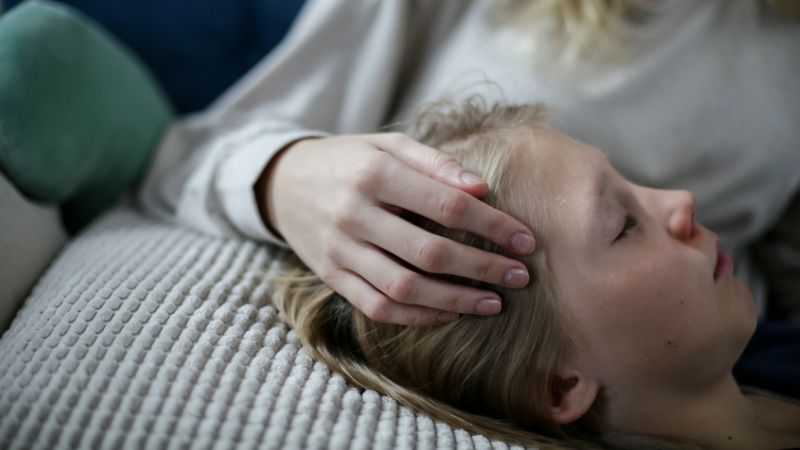

As parents, we all share the same goal of keeping our children safe and healthy. To achieve this, we go above and beyond to ensure that our homes are free from harmful contaminants that can compromise our family’s well-being. Unfortunately, one contaminant that grows easily and frequently spreads undetected is black mold. This mold can put your children at risk of allergic reactions or toxicity symptoms that can impair their vital functions. In this blog post, we explain more about the symptoms of black mold exposure in your home and how to keep your family safe from its effects.
What is Black Mold—How, Why, and Where it Grows
Also known as Stachybotrys Chartarum, black mold is a type of fungus that thrives in moist environments and can quickly reproduce if not detected and controlled in a timely manner.
A black mold infestation can arise in any area of the house where moisture or water is present, such as basements, bathrooms, and kitchens. In addition, one location that often gets overlooked is the attic. Because they are highly susceptible to water damage, moisture build-up or insufficient ventilation, attics are prime locations for black mold to grow and thrive.
Health Risks Associated with Black Mold Exposure
Are you wondering whether black mold is making you sick? The answer is yes. black mold can make you sick. It is therefore important to be aware of the health problems that can arise from acute or early-life black mold exposure.
Below are some of the top risks to your family’s health, particularly young children:
- Worsened pre-existing lung conditions such as asthma.
- Development of childhood asthma.
- Mental disorders such as anxiety, depression, brain fog, and insomnia may emerge or aggravate.
- Mycotoxicosis, also known as mold poisoning.
- Fungal infections, particularly for individuals who are immunocompromised.
- Development of chronic inflammatory response syndrome, fibromyalgia, mast cell activation disorder, histamine intolerance, irritable bowel syndrome, leaky gut, and multiple sclerosis.
Symptoms Related to Black Mold Exposure—Who is at Risk?
It’s important to note that black mold symptoms are diverse and unique to each individual. While certain individuals only experience allergy and irritation-related symptoms, those more vulnerable, such as children, the elderly and immunocompromised persons, may experience more severe, prolonged symptoms of black mold exposure.
If you’re experiencing any of the following, black mold may be making you sick:
- Respiratory – Sore throat, congestion, sinusitis, shortness of breath, wheezing, chest tightness, dry or prolonged cough
- Visual – Light sensitivity, blurred vision, red eyes, watery eyes
- Neurological – Mood changes, memory loss, headaches, ice pick pain, focus, and concentration issues, word recollection issues, confusion, disorientation, vertigo
- Physical – Body aches and pains, muscle cramps, weakness, skin rashes, nosebleeds, abdominal pain, stiffness, sweats, tingling, fatigue
How to Test Your Home for Black Mold Exposure
The best way to detect if you have a mold problem is by testing yourself and your home. Testing yourself for mold exposure can involve a skin prick allergy test performed by a doctor or a blood test at your local laboratory. These tests can help determine whether you have an allergic reaction to mold and the severity of your reaction.
While testing for mold in your home can be done with an over-the-counter test kit, be aware that these tests can give false results. If you are truly concerned about your health and that of your loved ones, it is strongly recommended that you contact an expert trained in mold detection. He or she can answer your questions and perform a professional air quality test to confirm the presence of mold in your home.
Conclusion
Black mold poses a significant health and safety threat to your family, as it can cause everything from a sore throat to abdominal pain. Knowing the signs to look out for, taking tests and being proactive in addressing an infestation can safeguard your children’s health and ensure they enjoy a healthy living environment for years to come.
Mold remediation is essential to restoring safety and comfort to your home. A good, certified mold remediation professional will walk you through the entire process, from assessing the infestation to the final air quality test. He should also point out the sources of moisture causing mold in your home so that you can remedy the problem as quickly as possible and allow you and your family to breathe safely.
Trust Steri Mobile To Help You Protect Your Family
At Steri Mobile, we understand how scary it can be to discover mold in your home, especially if you have young children. Our team of experts is here to answer all your questions about black mold and help you get it out of your home for good. Please feel free to contact us to take advantage of our professional mold detection and mold remediation services.
